ICT710 Assignment 2: ICT Professional Practice and Ethics Report
VerifiedAdded on 2023/04/04
|13
|2956
|55
Report
AI Summary
This report provides an executive summary and detailed analysis of the Cambridge Analytica scandal, focusing on the ethical and professional implications of the Facebook data breach. The report employs the 'doing ethics technique' and relevant ethical theories, such as utilitarianism and deontology, to evaluate the actions of involved parties. It examines the application of the Australian Computer Society's (ACS) Professional Code of Ethics to the case, assessing whether ICT professionals adhered to ethical guidelines. The report identifies ethical issues, analyzes the impact on stakeholders, and offers recommendations for addressing the ethical challenges presented. The report also explores alternative options and suggests the best course of action to mitigate the ethical concerns raised by the Cambridge Analytica scandal. This assignment is designed to provide a comprehensive understanding of ethical considerations in ICT practice.

ICT Professional Practice and Ethics
Paraphrase This Document
Need a fresh take? Get an instant paraphrase of this document with our AI Paraphraser
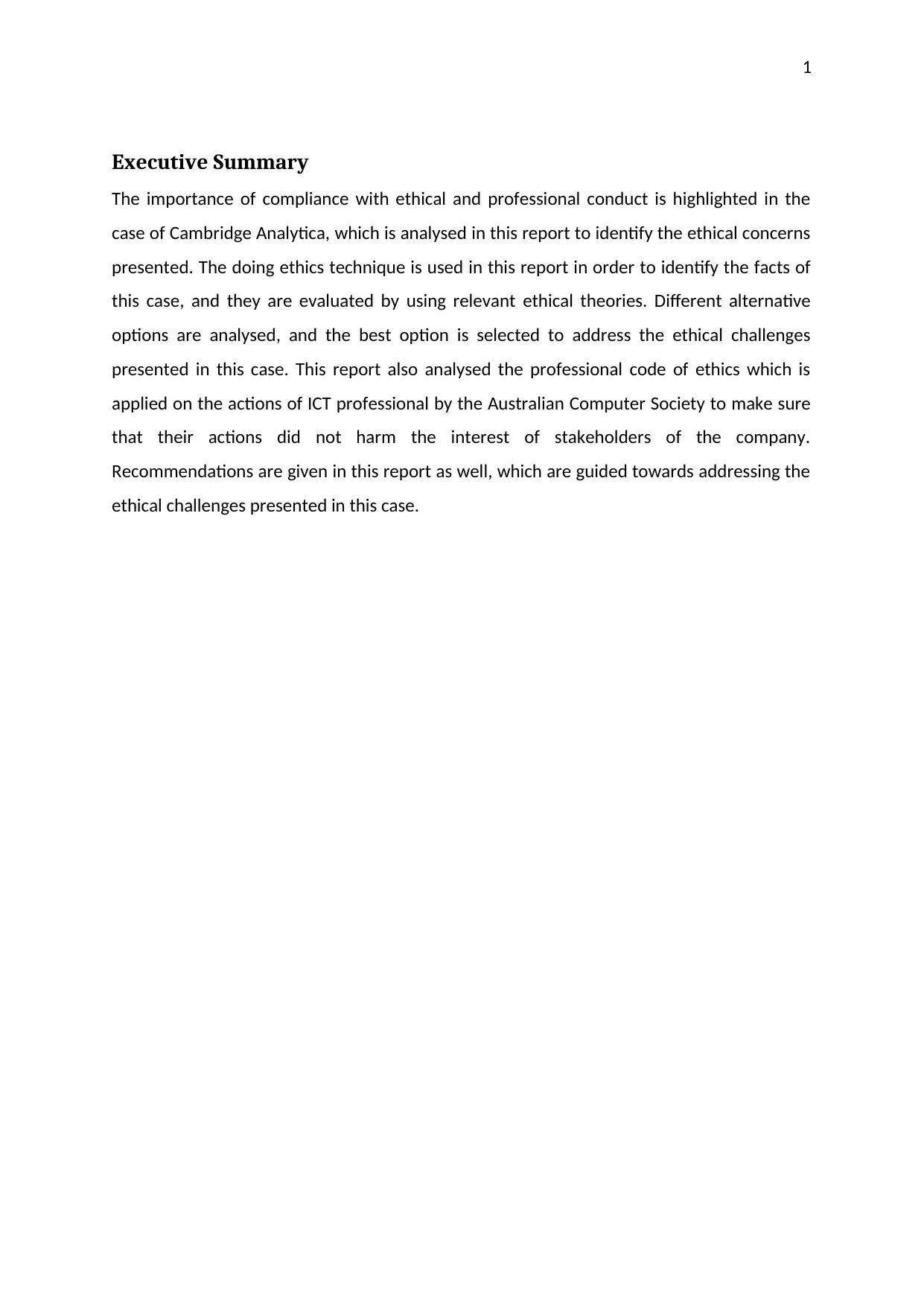
1
Executive Summary
The importance of compliance with ethical and professional conduct is highlighted in the
case of Cambridge Analytica, which is analysed in this report to identify the ethical concerns
presented. The doing ethics technique is used in this report in order to identify the facts of
this case, and they are evaluated by using relevant ethical theories. Different alternative
options are analysed, and the best option is selected to address the ethical challenges
presented in this case. This report also analysed the professional code of ethics which is
applied on the actions of ICT professional by the Australian Computer Society to make sure
that their actions did not harm the interest of stakeholders of the company.
Recommendations are given in this report as well, which are guided towards addressing the
ethical challenges presented in this case.
Executive Summary
The importance of compliance with ethical and professional conduct is highlighted in the
case of Cambridge Analytica, which is analysed in this report to identify the ethical concerns
presented. The doing ethics technique is used in this report in order to identify the facts of
this case, and they are evaluated by using relevant ethical theories. Different alternative
options are analysed, and the best option is selected to address the ethical challenges
presented in this case. This report also analysed the professional code of ethics which is
applied on the actions of ICT professional by the Australian Computer Society to make sure
that their actions did not harm the interest of stakeholders of the company.
Recommendations are given in this report as well, which are guided towards addressing the
ethical challenges presented in this case.
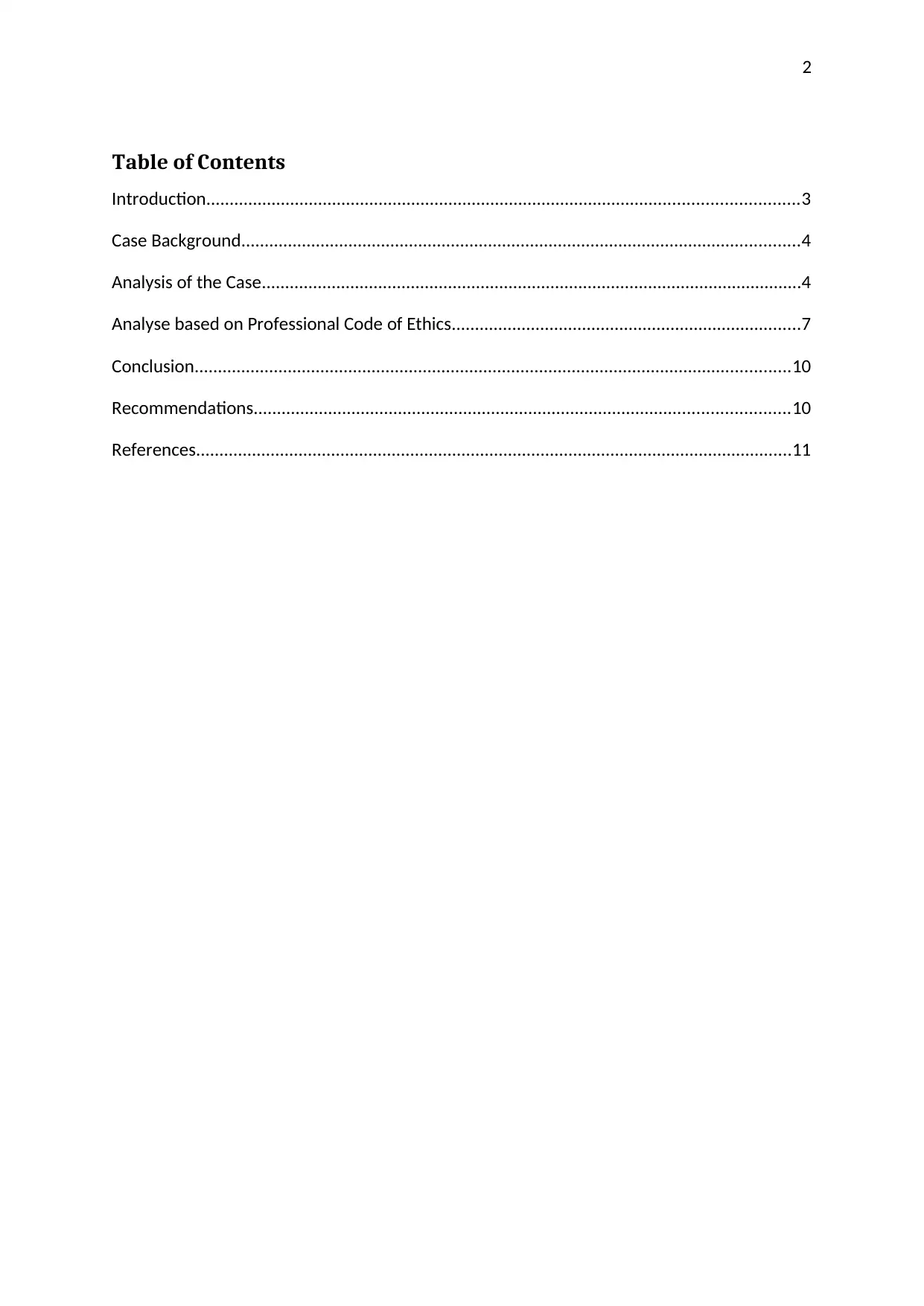
2
Table of Contents
Introduction...............................................................................................................................3
Case Background........................................................................................................................4
Analysis of the Case....................................................................................................................4
Analyse based on Professional Code of Ethics...........................................................................7
Conclusion................................................................................................................................10
Recommendations...................................................................................................................10
References................................................................................................................................11
Table of Contents
Introduction...............................................................................................................................3
Case Background........................................................................................................................4
Analysis of the Case....................................................................................................................4
Analyse based on Professional Code of Ethics...........................................................................7
Conclusion................................................................................................................................10
Recommendations...................................................................................................................10
References................................................................................................................................11
⊘ This is a preview!⊘
Do you want full access?
Subscribe today to unlock all pages.

Trusted by 1+ million students worldwide
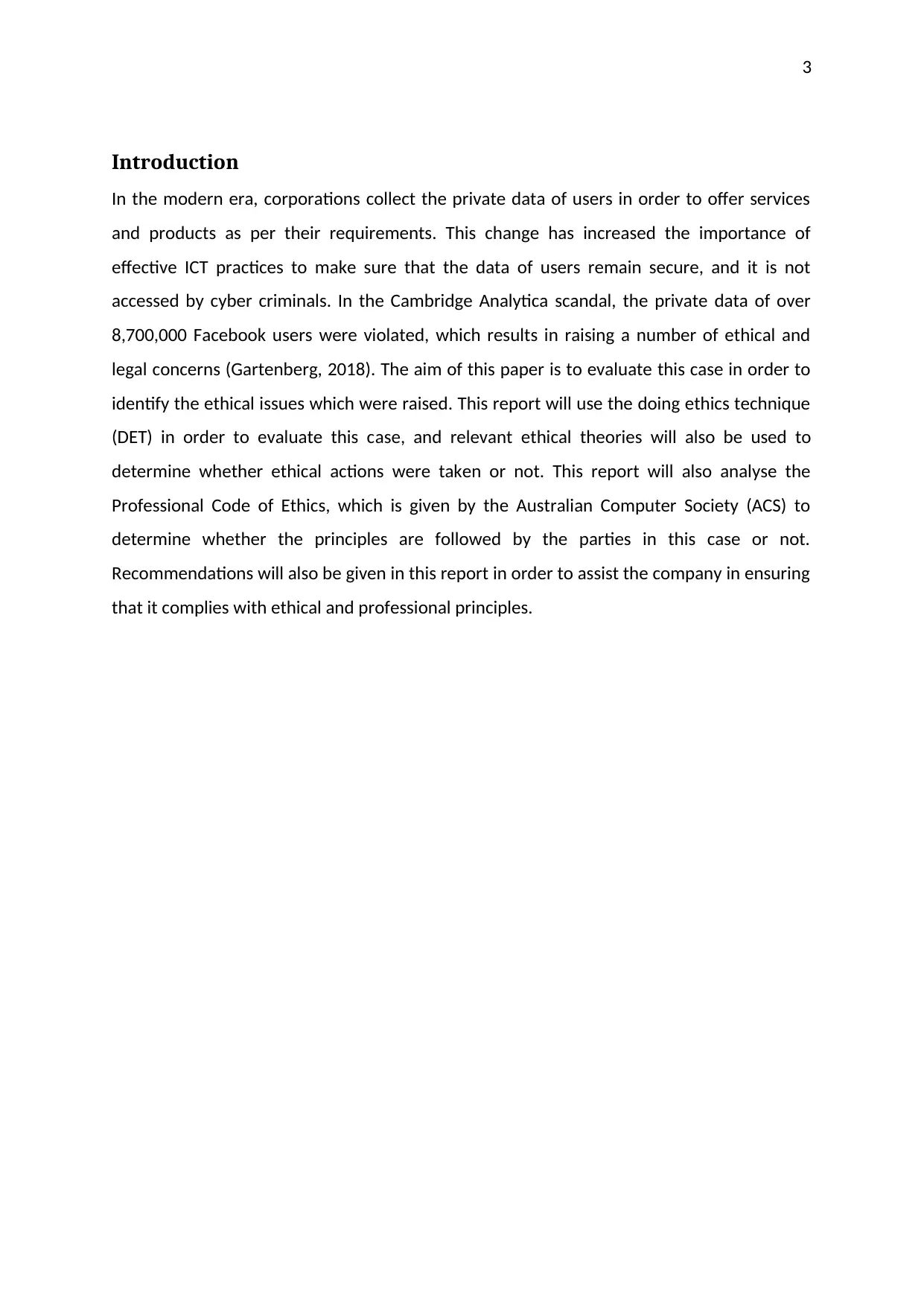
3
Introduction
In the modern era, corporations collect the private data of users in order to offer services
and products as per their requirements. This change has increased the importance of
effective ICT practices to make sure that the data of users remain secure, and it is not
accessed by cyber criminals. In the Cambridge Analytica scandal, the private data of over
8,700,000 Facebook users were violated, which results in raising a number of ethical and
legal concerns (Gartenberg, 2018). The aim of this paper is to evaluate this case in order to
identify the ethical issues which were raised. This report will use the doing ethics technique
(DET) in order to evaluate this case, and relevant ethical theories will also be used to
determine whether ethical actions were taken or not. This report will also analyse the
Professional Code of Ethics, which is given by the Australian Computer Society (ACS) to
determine whether the principles are followed by the parties in this case or not.
Recommendations will also be given in this report in order to assist the company in ensuring
that it complies with ethical and professional principles.
Introduction
In the modern era, corporations collect the private data of users in order to offer services
and products as per their requirements. This change has increased the importance of
effective ICT practices to make sure that the data of users remain secure, and it is not
accessed by cyber criminals. In the Cambridge Analytica scandal, the private data of over
8,700,000 Facebook users were violated, which results in raising a number of ethical and
legal concerns (Gartenberg, 2018). The aim of this paper is to evaluate this case in order to
identify the ethical issues which were raised. This report will use the doing ethics technique
(DET) in order to evaluate this case, and relevant ethical theories will also be used to
determine whether ethical actions were taken or not. This report will also analyse the
Professional Code of Ethics, which is given by the Australian Computer Society (ACS) to
determine whether the principles are followed by the parties in this case or not.
Recommendations will also be given in this report in order to assist the company in ensuring
that it complies with ethical and professional principles.
Paraphrase This Document
Need a fresh take? Get an instant paraphrase of this document with our AI Paraphraser
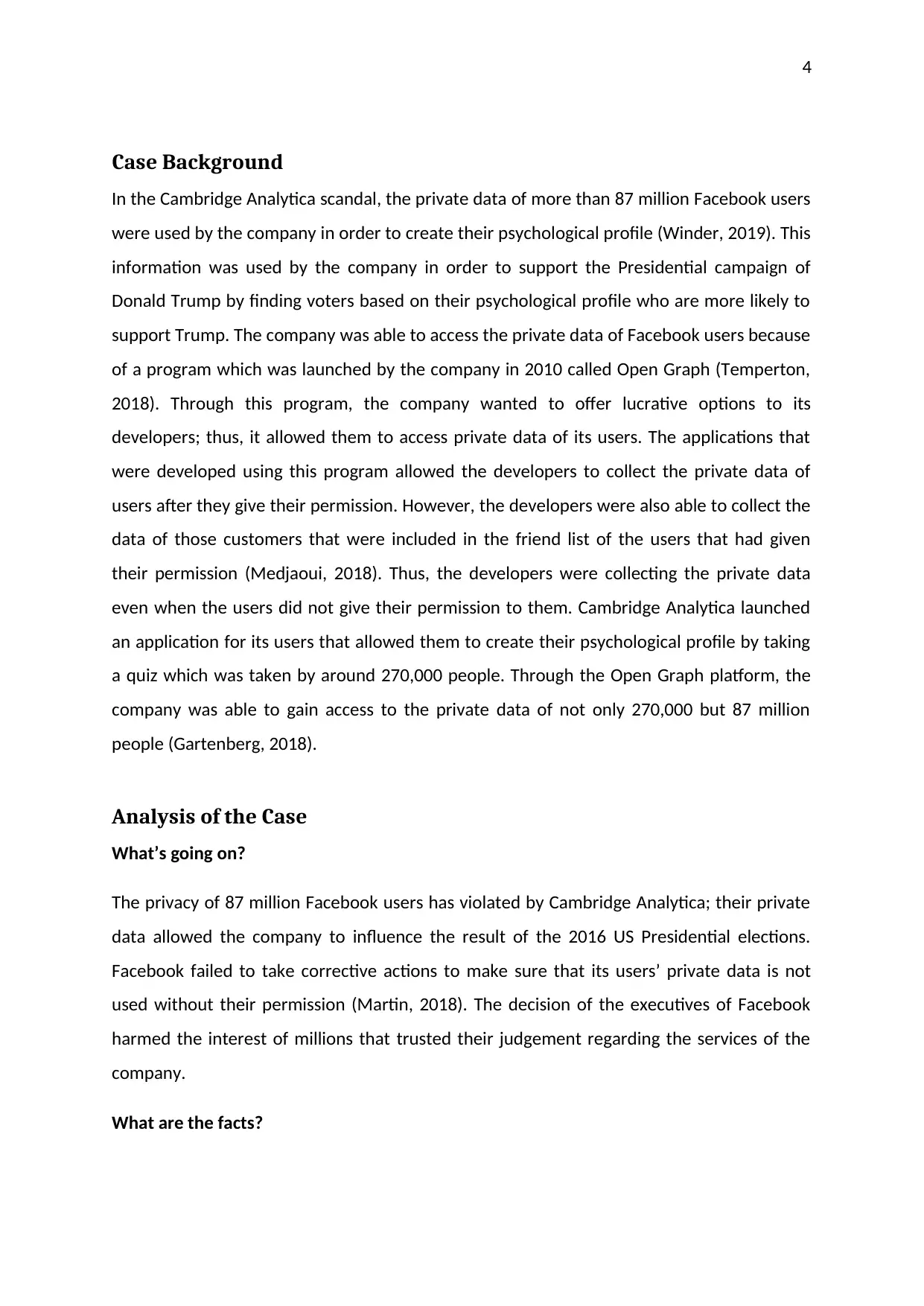
4
Case Background
In the Cambridge Analytica scandal, the private data of more than 87 million Facebook users
were used by the company in order to create their psychological profile (Winder, 2019). This
information was used by the company in order to support the Presidential campaign of
Donald Trump by finding voters based on their psychological profile who are more likely to
support Trump. The company was able to access the private data of Facebook users because
of a program which was launched by the company in 2010 called Open Graph (Temperton,
2018). Through this program, the company wanted to offer lucrative options to its
developers; thus, it allowed them to access private data of its users. The applications that
were developed using this program allowed the developers to collect the private data of
users after they give their permission. However, the developers were also able to collect the
data of those customers that were included in the friend list of the users that had given
their permission (Medjaoui, 2018). Thus, the developers were collecting the private data
even when the users did not give their permission to them. Cambridge Analytica launched
an application for its users that allowed them to create their psychological profile by taking
a quiz which was taken by around 270,000 people. Through the Open Graph platform, the
company was able to gain access to the private data of not only 270,000 but 87 million
people (Gartenberg, 2018).
Analysis of the Case
What’s going on?
The privacy of 87 million Facebook users has violated by Cambridge Analytica; their private
data allowed the company to influence the result of the 2016 US Presidential elections.
Facebook failed to take corrective actions to make sure that its users’ private data is not
used without their permission (Martin, 2018). The decision of the executives of Facebook
harmed the interest of millions that trusted their judgement regarding the services of the
company.
What are the facts?
Case Background
In the Cambridge Analytica scandal, the private data of more than 87 million Facebook users
were used by the company in order to create their psychological profile (Winder, 2019). This
information was used by the company in order to support the Presidential campaign of
Donald Trump by finding voters based on their psychological profile who are more likely to
support Trump. The company was able to access the private data of Facebook users because
of a program which was launched by the company in 2010 called Open Graph (Temperton,
2018). Through this program, the company wanted to offer lucrative options to its
developers; thus, it allowed them to access private data of its users. The applications that
were developed using this program allowed the developers to collect the private data of
users after they give their permission. However, the developers were also able to collect the
data of those customers that were included in the friend list of the users that had given
their permission (Medjaoui, 2018). Thus, the developers were collecting the private data
even when the users did not give their permission to them. Cambridge Analytica launched
an application for its users that allowed them to create their psychological profile by taking
a quiz which was taken by around 270,000 people. Through the Open Graph platform, the
company was able to gain access to the private data of not only 270,000 but 87 million
people (Gartenberg, 2018).
Analysis of the Case
What’s going on?
The privacy of 87 million Facebook users has violated by Cambridge Analytica; their private
data allowed the company to influence the result of the 2016 US Presidential elections.
Facebook failed to take corrective actions to make sure that its users’ private data is not
used without their permission (Martin, 2018). The decision of the executives of Facebook
harmed the interest of millions that trusted their judgement regarding the services of the
company.
What are the facts?
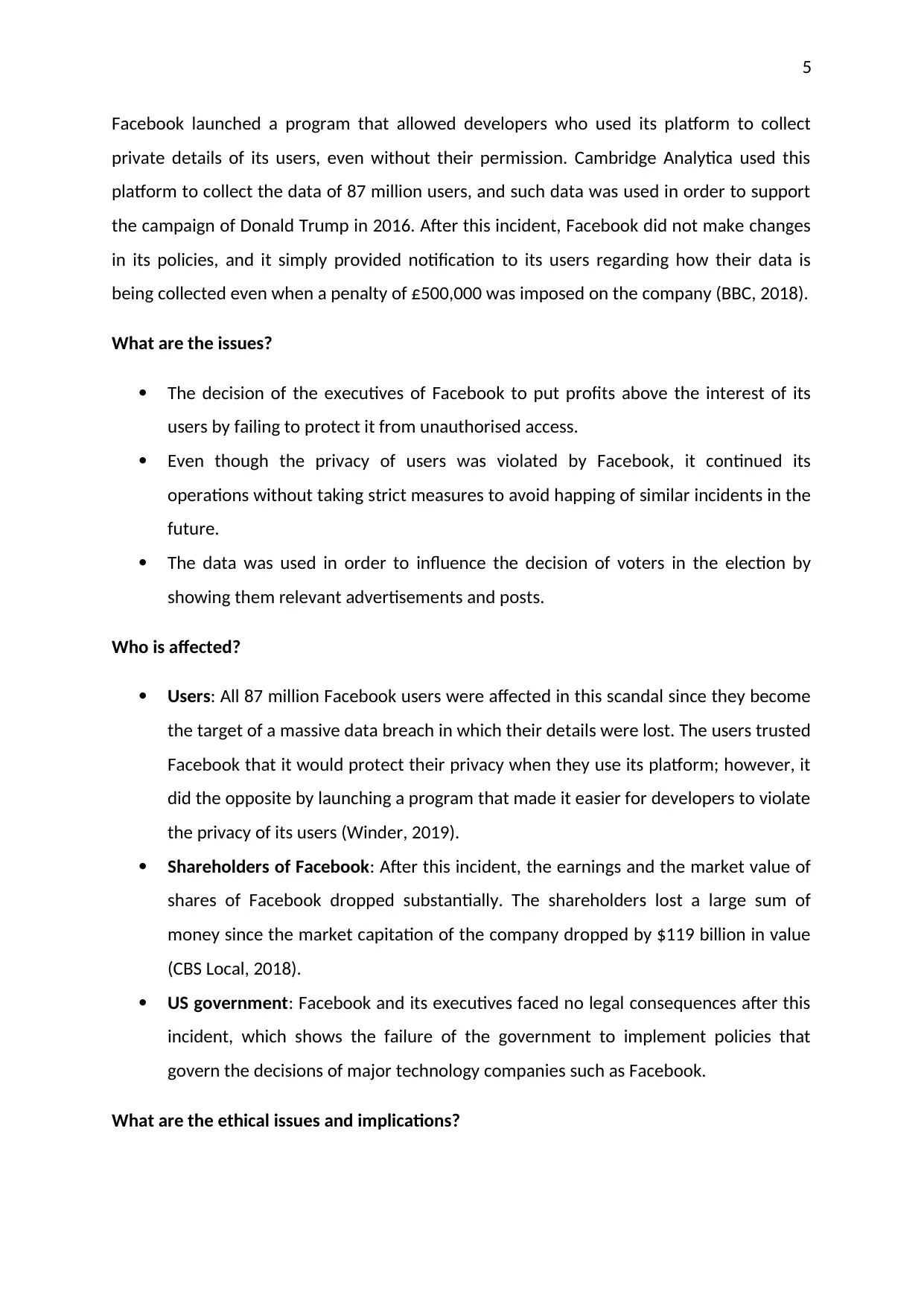
5
Facebook launched a program that allowed developers who used its platform to collect
private details of its users, even without their permission. Cambridge Analytica used this
platform to collect the data of 87 million users, and such data was used in order to support
the campaign of Donald Trump in 2016. After this incident, Facebook did not make changes
in its policies, and it simply provided notification to its users regarding how their data is
being collected even when a penalty of £500,000 was imposed on the company (BBC, 2018).
What are the issues?
The decision of the executives of Facebook to put profits above the interest of its
users by failing to protect it from unauthorised access.
Even though the privacy of users was violated by Facebook, it continued its
operations without taking strict measures to avoid happing of similar incidents in the
future.
The data was used in order to influence the decision of voters in the election by
showing them relevant advertisements and posts.
Who is affected?
Users: All 87 million Facebook users were affected in this scandal since they become
the target of a massive data breach in which their details were lost. The users trusted
Facebook that it would protect their privacy when they use its platform; however, it
did the opposite by launching a program that made it easier for developers to violate
the privacy of its users (Winder, 2019).
Shareholders of Facebook: After this incident, the earnings and the market value of
shares of Facebook dropped substantially. The shareholders lost a large sum of
money since the market capitation of the company dropped by $119 billion in value
(CBS Local, 2018).
US government: Facebook and its executives faced no legal consequences after this
incident, which shows the failure of the government to implement policies that
govern the decisions of major technology companies such as Facebook.
What are the ethical issues and implications?
Facebook launched a program that allowed developers who used its platform to collect
private details of its users, even without their permission. Cambridge Analytica used this
platform to collect the data of 87 million users, and such data was used in order to support
the campaign of Donald Trump in 2016. After this incident, Facebook did not make changes
in its policies, and it simply provided notification to its users regarding how their data is
being collected even when a penalty of £500,000 was imposed on the company (BBC, 2018).
What are the issues?
The decision of the executives of Facebook to put profits above the interest of its
users by failing to protect it from unauthorised access.
Even though the privacy of users was violated by Facebook, it continued its
operations without taking strict measures to avoid happing of similar incidents in the
future.
The data was used in order to influence the decision of voters in the election by
showing them relevant advertisements and posts.
Who is affected?
Users: All 87 million Facebook users were affected in this scandal since they become
the target of a massive data breach in which their details were lost. The users trusted
Facebook that it would protect their privacy when they use its platform; however, it
did the opposite by launching a program that made it easier for developers to violate
the privacy of its users (Winder, 2019).
Shareholders of Facebook: After this incident, the earnings and the market value of
shares of Facebook dropped substantially. The shareholders lost a large sum of
money since the market capitation of the company dropped by $119 billion in value
(CBS Local, 2018).
US government: Facebook and its executives faced no legal consequences after this
incident, which shows the failure of the government to implement policies that
govern the decisions of major technology companies such as Facebook.
What are the ethical issues and implications?
⊘ This is a preview!⊘
Do you want full access?
Subscribe today to unlock all pages.

Trusted by 1+ million students worldwide
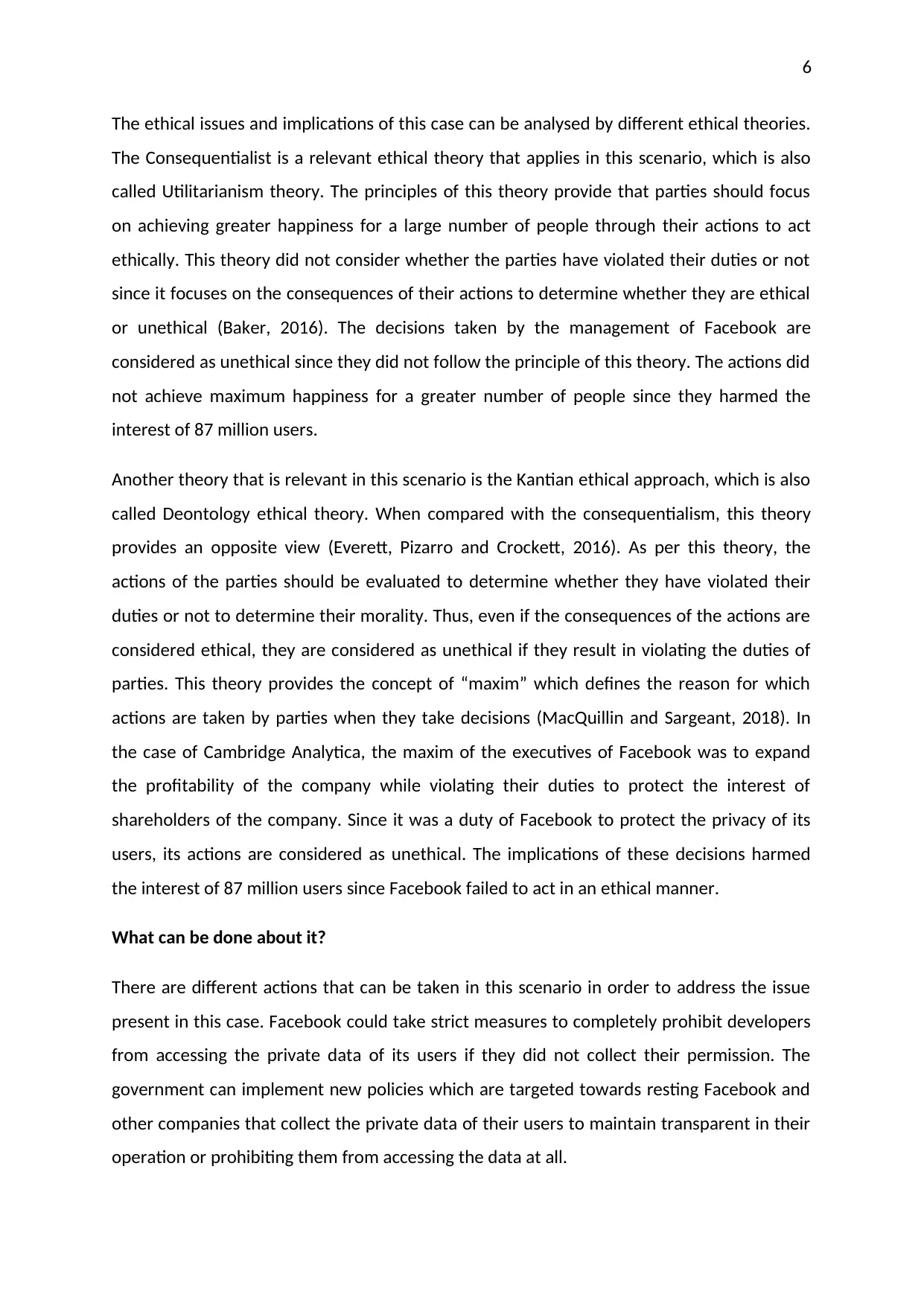
6
The ethical issues and implications of this case can be analysed by different ethical theories.
The Consequentialist is a relevant ethical theory that applies in this scenario, which is also
called Utilitarianism theory. The principles of this theory provide that parties should focus
on achieving greater happiness for a large number of people through their actions to act
ethically. This theory did not consider whether the parties have violated their duties or not
since it focuses on the consequences of their actions to determine whether they are ethical
or unethical (Baker, 2016). The decisions taken by the management of Facebook are
considered as unethical since they did not follow the principle of this theory. The actions did
not achieve maximum happiness for a greater number of people since they harmed the
interest of 87 million users.
Another theory that is relevant in this scenario is the Kantian ethical approach, which is also
called Deontology ethical theory. When compared with the consequentialism, this theory
provides an opposite view (Everett, Pizarro and Crockett, 2016). As per this theory, the
actions of the parties should be evaluated to determine whether they have violated their
duties or not to determine their morality. Thus, even if the consequences of the actions are
considered ethical, they are considered as unethical if they result in violating the duties of
parties. This theory provides the concept of “maxim” which defines the reason for which
actions are taken by parties when they take decisions (MacQuillin and Sargeant, 2018). In
the case of Cambridge Analytica, the maxim of the executives of Facebook was to expand
the profitability of the company while violating their duties to protect the interest of
shareholders of the company. Since it was a duty of Facebook to protect the privacy of its
users, its actions are considered as unethical. The implications of these decisions harmed
the interest of 87 million users since Facebook failed to act in an ethical manner.
What can be done about it?
There are different actions that can be taken in this scenario in order to address the issue
present in this case. Facebook could take strict measures to completely prohibit developers
from accessing the private data of its users if they did not collect their permission. The
government can implement new policies which are targeted towards resting Facebook and
other companies that collect the private data of their users to maintain transparent in their
operation or prohibiting them from accessing the data at all.
The ethical issues and implications of this case can be analysed by different ethical theories.
The Consequentialist is a relevant ethical theory that applies in this scenario, which is also
called Utilitarianism theory. The principles of this theory provide that parties should focus
on achieving greater happiness for a large number of people through their actions to act
ethically. This theory did not consider whether the parties have violated their duties or not
since it focuses on the consequences of their actions to determine whether they are ethical
or unethical (Baker, 2016). The decisions taken by the management of Facebook are
considered as unethical since they did not follow the principle of this theory. The actions did
not achieve maximum happiness for a greater number of people since they harmed the
interest of 87 million users.
Another theory that is relevant in this scenario is the Kantian ethical approach, which is also
called Deontology ethical theory. When compared with the consequentialism, this theory
provides an opposite view (Everett, Pizarro and Crockett, 2016). As per this theory, the
actions of the parties should be evaluated to determine whether they have violated their
duties or not to determine their morality. Thus, even if the consequences of the actions are
considered ethical, they are considered as unethical if they result in violating the duties of
parties. This theory provides the concept of “maxim” which defines the reason for which
actions are taken by parties when they take decisions (MacQuillin and Sargeant, 2018). In
the case of Cambridge Analytica, the maxim of the executives of Facebook was to expand
the profitability of the company while violating their duties to protect the interest of
shareholders of the company. Since it was a duty of Facebook to protect the privacy of its
users, its actions are considered as unethical. The implications of these decisions harmed
the interest of 87 million users since Facebook failed to act in an ethical manner.
What can be done about it?
There are different actions that can be taken in this scenario in order to address the issue
present in this case. Facebook could take strict measures to completely prohibit developers
from accessing the private data of its users if they did not collect their permission. The
government can implement new policies which are targeted towards resting Facebook and
other companies that collect the private data of their users to maintain transparent in their
operation or prohibiting them from accessing the data at all.
Paraphrase This Document
Need a fresh take? Get an instant paraphrase of this document with our AI Paraphraser
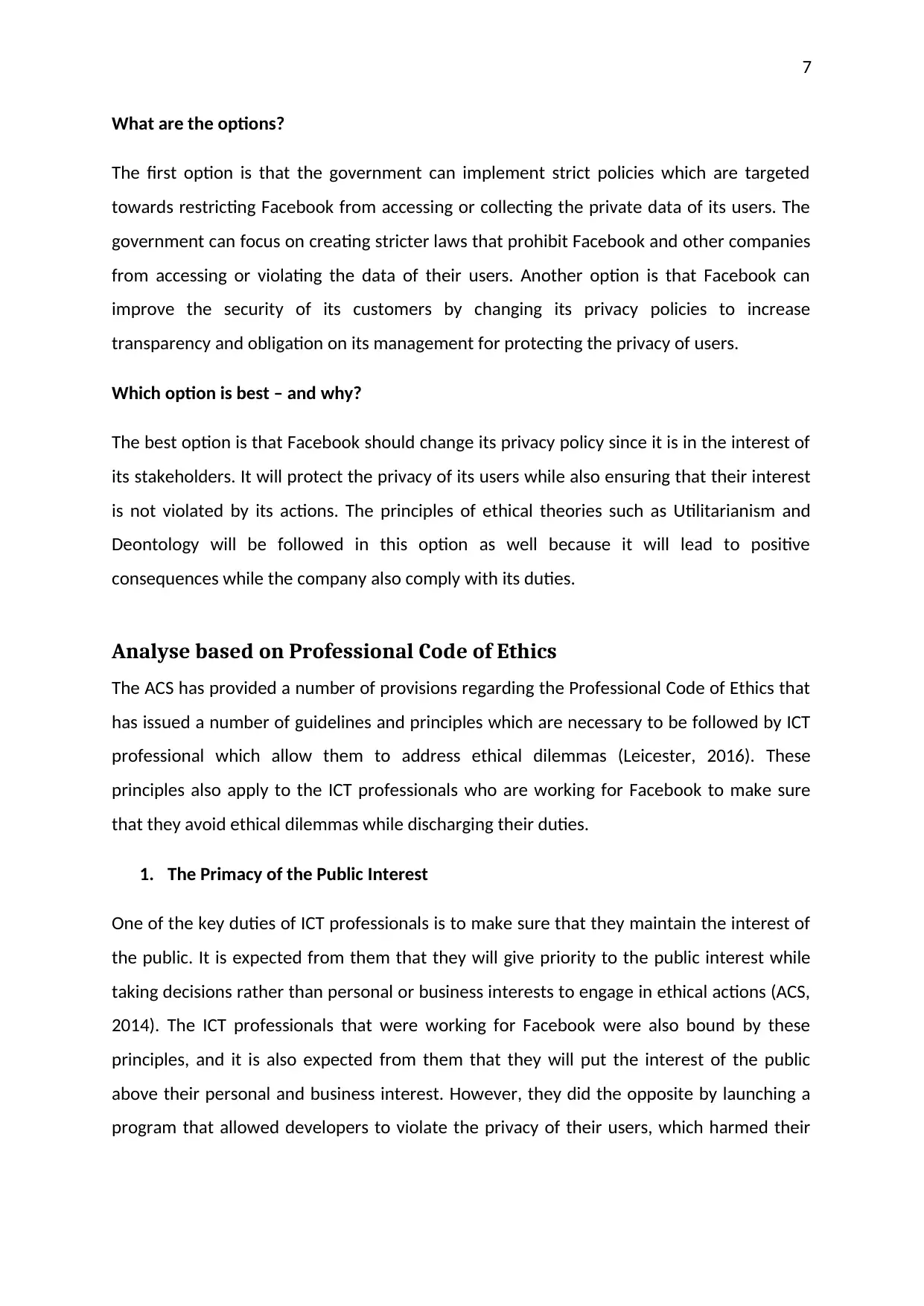
7
What are the options?
The first option is that the government can implement strict policies which are targeted
towards restricting Facebook from accessing or collecting the private data of its users. The
government can focus on creating stricter laws that prohibit Facebook and other companies
from accessing or violating the data of their users. Another option is that Facebook can
improve the security of its customers by changing its privacy policies to increase
transparency and obligation on its management for protecting the privacy of users.
Which option is best – and why?
The best option is that Facebook should change its privacy policy since it is in the interest of
its stakeholders. It will protect the privacy of its users while also ensuring that their interest
is not violated by its actions. The principles of ethical theories such as Utilitarianism and
Deontology will be followed in this option as well because it will lead to positive
consequences while the company also comply with its duties.
Analyse based on Professional Code of Ethics
The ACS has provided a number of provisions regarding the Professional Code of Ethics that
has issued a number of guidelines and principles which are necessary to be followed by ICT
professional which allow them to address ethical dilemmas (Leicester, 2016). These
principles also apply to the ICT professionals who are working for Facebook to make sure
that they avoid ethical dilemmas while discharging their duties.
1. The Primacy of the Public Interest
One of the key duties of ICT professionals is to make sure that they maintain the interest of
the public. It is expected from them that they will give priority to the public interest while
taking decisions rather than personal or business interests to engage in ethical actions (ACS,
2014). The ICT professionals that were working for Facebook were also bound by these
principles, and it is also expected from them that they will put the interest of the public
above their personal and business interest. However, they did the opposite by launching a
program that allowed developers to violate the privacy of their users, which harmed their
What are the options?
The first option is that the government can implement strict policies which are targeted
towards restricting Facebook from accessing or collecting the private data of its users. The
government can focus on creating stricter laws that prohibit Facebook and other companies
from accessing or violating the data of their users. Another option is that Facebook can
improve the security of its customers by changing its privacy policies to increase
transparency and obligation on its management for protecting the privacy of users.
Which option is best – and why?
The best option is that Facebook should change its privacy policy since it is in the interest of
its stakeholders. It will protect the privacy of its users while also ensuring that their interest
is not violated by its actions. The principles of ethical theories such as Utilitarianism and
Deontology will be followed in this option as well because it will lead to positive
consequences while the company also comply with its duties.
Analyse based on Professional Code of Ethics
The ACS has provided a number of provisions regarding the Professional Code of Ethics that
has issued a number of guidelines and principles which are necessary to be followed by ICT
professional which allow them to address ethical dilemmas (Leicester, 2016). These
principles also apply to the ICT professionals who are working for Facebook to make sure
that they avoid ethical dilemmas while discharging their duties.
1. The Primacy of the Public Interest
One of the key duties of ICT professionals is to make sure that they maintain the interest of
the public. It is expected from them that they will give priority to the public interest while
taking decisions rather than personal or business interests to engage in ethical actions (ACS,
2014). The ICT professionals that were working for Facebook were also bound by these
principles, and it is also expected from them that they will put the interest of the public
above their personal and business interest. However, they did the opposite by launching a
program that allowed developers to violate the privacy of their users, which harmed their
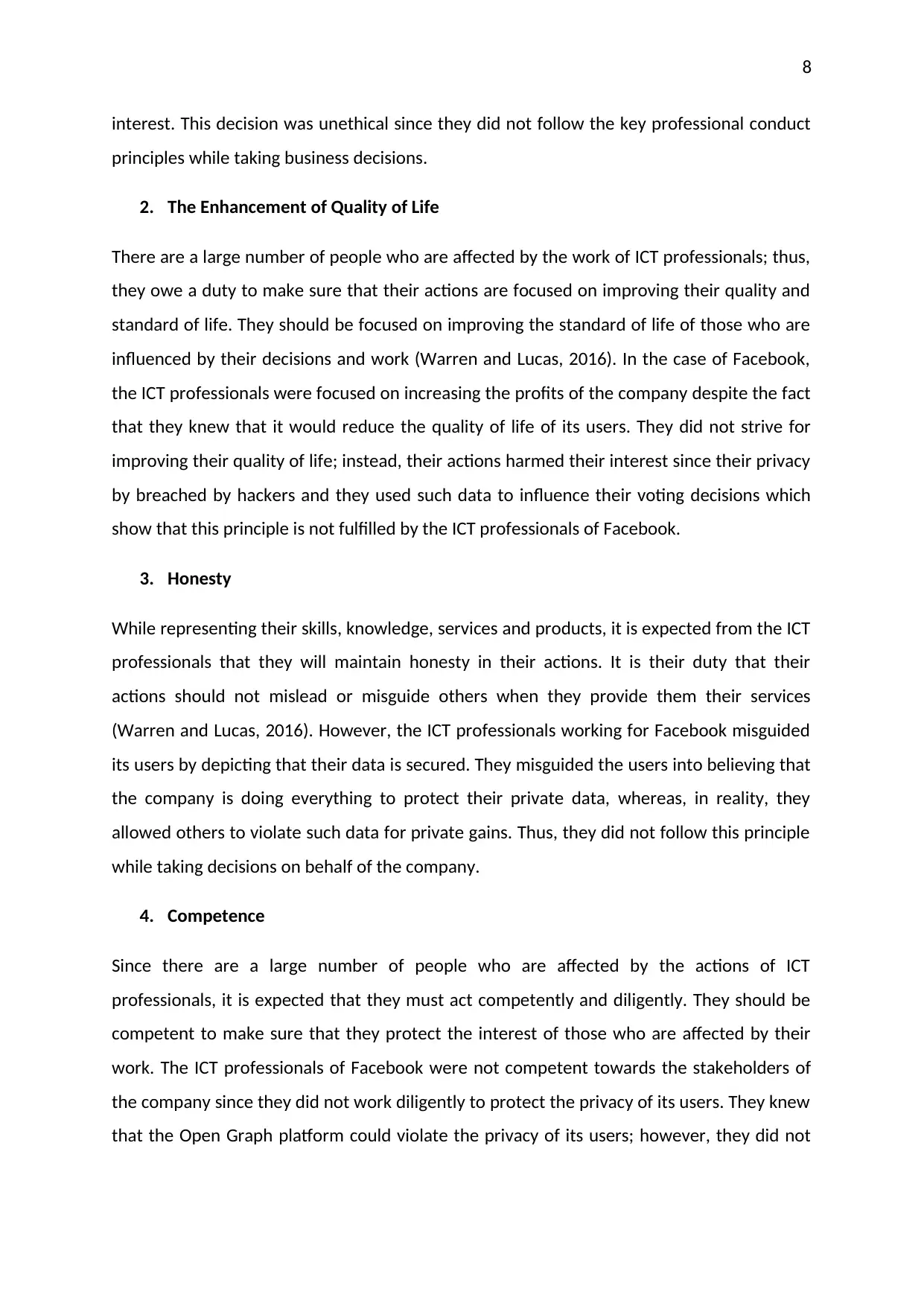
8
interest. This decision was unethical since they did not follow the key professional conduct
principles while taking business decisions.
2. The Enhancement of Quality of Life
There are a large number of people who are affected by the work of ICT professionals; thus,
they owe a duty to make sure that their actions are focused on improving their quality and
standard of life. They should be focused on improving the standard of life of those who are
influenced by their decisions and work (Warren and Lucas, 2016). In the case of Facebook,
the ICT professionals were focused on increasing the profits of the company despite the fact
that they knew that it would reduce the quality of life of its users. They did not strive for
improving their quality of life; instead, their actions harmed their interest since their privacy
by breached by hackers and they used such data to influence their voting decisions which
show that this principle is not fulfilled by the ICT professionals of Facebook.
3. Honesty
While representing their skills, knowledge, services and products, it is expected from the ICT
professionals that they will maintain honesty in their actions. It is their duty that their
actions should not mislead or misguide others when they provide them their services
(Warren and Lucas, 2016). However, the ICT professionals working for Facebook misguided
its users by depicting that their data is secured. They misguided the users into believing that
the company is doing everything to protect their private data, whereas, in reality, they
allowed others to violate such data for private gains. Thus, they did not follow this principle
while taking decisions on behalf of the company.
4. Competence
Since there are a large number of people who are affected by the actions of ICT
professionals, it is expected that they must act competently and diligently. They should be
competent to make sure that they protect the interest of those who are affected by their
work. The ICT professionals of Facebook were not competent towards the stakeholders of
the company since they did not work diligently to protect the privacy of its users. They knew
that the Open Graph platform could violate the privacy of its users; however, they did not
interest. This decision was unethical since they did not follow the key professional conduct
principles while taking business decisions.
2. The Enhancement of Quality of Life
There are a large number of people who are affected by the work of ICT professionals; thus,
they owe a duty to make sure that their actions are focused on improving their quality and
standard of life. They should be focused on improving the standard of life of those who are
influenced by their decisions and work (Warren and Lucas, 2016). In the case of Facebook,
the ICT professionals were focused on increasing the profits of the company despite the fact
that they knew that it would reduce the quality of life of its users. They did not strive for
improving their quality of life; instead, their actions harmed their interest since their privacy
by breached by hackers and they used such data to influence their voting decisions which
show that this principle is not fulfilled by the ICT professionals of Facebook.
3. Honesty
While representing their skills, knowledge, services and products, it is expected from the ICT
professionals that they will maintain honesty in their actions. It is their duty that their
actions should not mislead or misguide others when they provide them their services
(Warren and Lucas, 2016). However, the ICT professionals working for Facebook misguided
its users by depicting that their data is secured. They misguided the users into believing that
the company is doing everything to protect their private data, whereas, in reality, they
allowed others to violate such data for private gains. Thus, they did not follow this principle
while taking decisions on behalf of the company.
4. Competence
Since there are a large number of people who are affected by the actions of ICT
professionals, it is expected that they must act competently and diligently. They should be
competent to make sure that they protect the interest of those who are affected by their
work. The ICT professionals of Facebook were not competent towards the stakeholders of
the company since they did not work diligently to protect the privacy of its users. They knew
that the Open Graph platform could violate the privacy of its users; however, they did not
⊘ This is a preview!⊘
Do you want full access?
Subscribe today to unlock all pages.

Trusted by 1+ million students worldwide
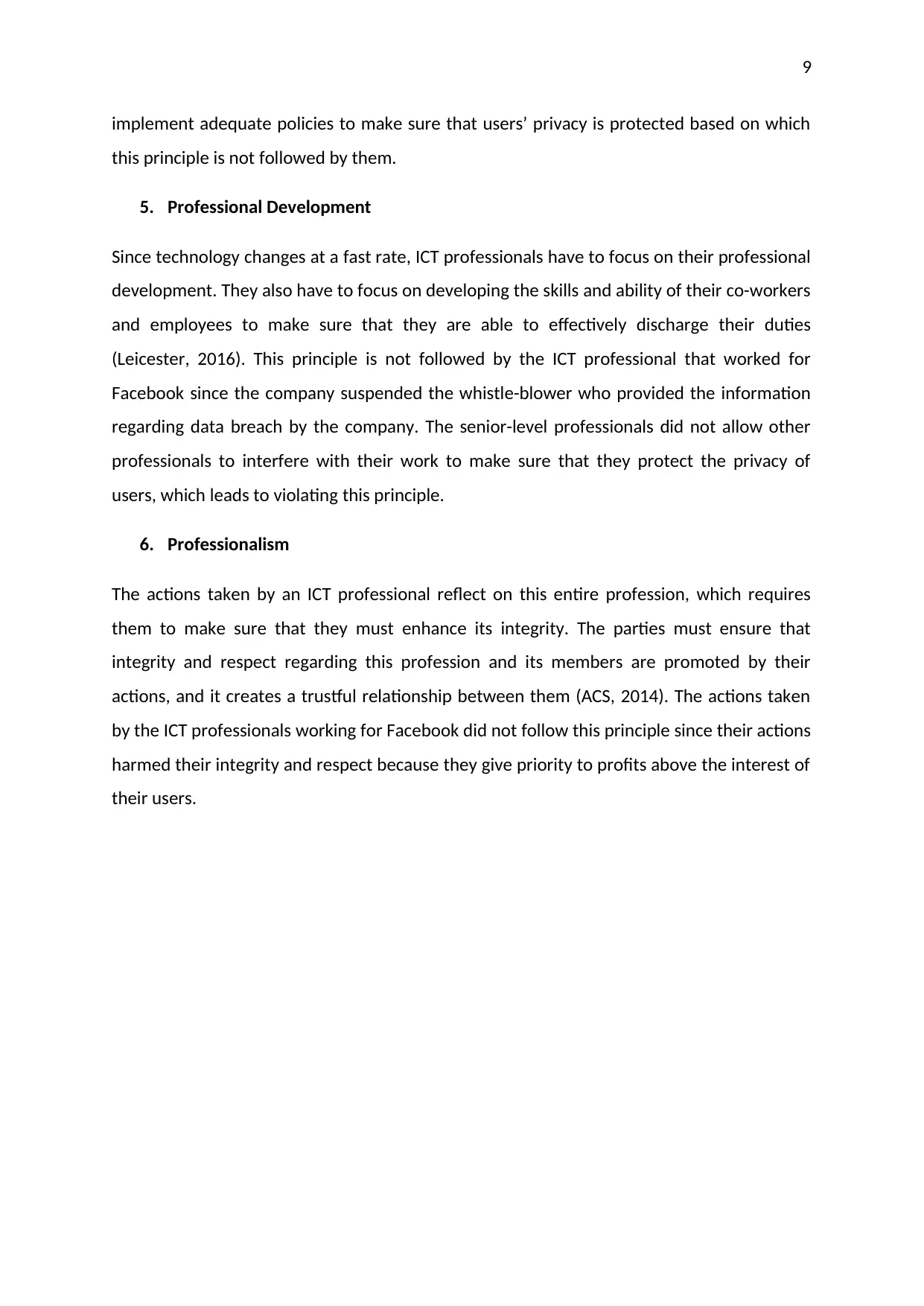
9
implement adequate policies to make sure that users’ privacy is protected based on which
this principle is not followed by them.
5. Professional Development
Since technology changes at a fast rate, ICT professionals have to focus on their professional
development. They also have to focus on developing the skills and ability of their co-workers
and employees to make sure that they are able to effectively discharge their duties
(Leicester, 2016). This principle is not followed by the ICT professional that worked for
Facebook since the company suspended the whistle-blower who provided the information
regarding data breach by the company. The senior-level professionals did not allow other
professionals to interfere with their work to make sure that they protect the privacy of
users, which leads to violating this principle.
6. Professionalism
The actions taken by an ICT professional reflect on this entire profession, which requires
them to make sure that they must enhance its integrity. The parties must ensure that
integrity and respect regarding this profession and its members are promoted by their
actions, and it creates a trustful relationship between them (ACS, 2014). The actions taken
by the ICT professionals working for Facebook did not follow this principle since their actions
harmed their integrity and respect because they give priority to profits above the interest of
their users.
implement adequate policies to make sure that users’ privacy is protected based on which
this principle is not followed by them.
5. Professional Development
Since technology changes at a fast rate, ICT professionals have to focus on their professional
development. They also have to focus on developing the skills and ability of their co-workers
and employees to make sure that they are able to effectively discharge their duties
(Leicester, 2016). This principle is not followed by the ICT professional that worked for
Facebook since the company suspended the whistle-blower who provided the information
regarding data breach by the company. The senior-level professionals did not allow other
professionals to interfere with their work to make sure that they protect the privacy of
users, which leads to violating this principle.
6. Professionalism
The actions taken by an ICT professional reflect on this entire profession, which requires
them to make sure that they must enhance its integrity. The parties must ensure that
integrity and respect regarding this profession and its members are promoted by their
actions, and it creates a trustful relationship between them (ACS, 2014). The actions taken
by the ICT professionals working for Facebook did not follow this principle since their actions
harmed their integrity and respect because they give priority to profits above the interest of
their users.
Paraphrase This Document
Need a fresh take? Get an instant paraphrase of this document with our AI Paraphraser
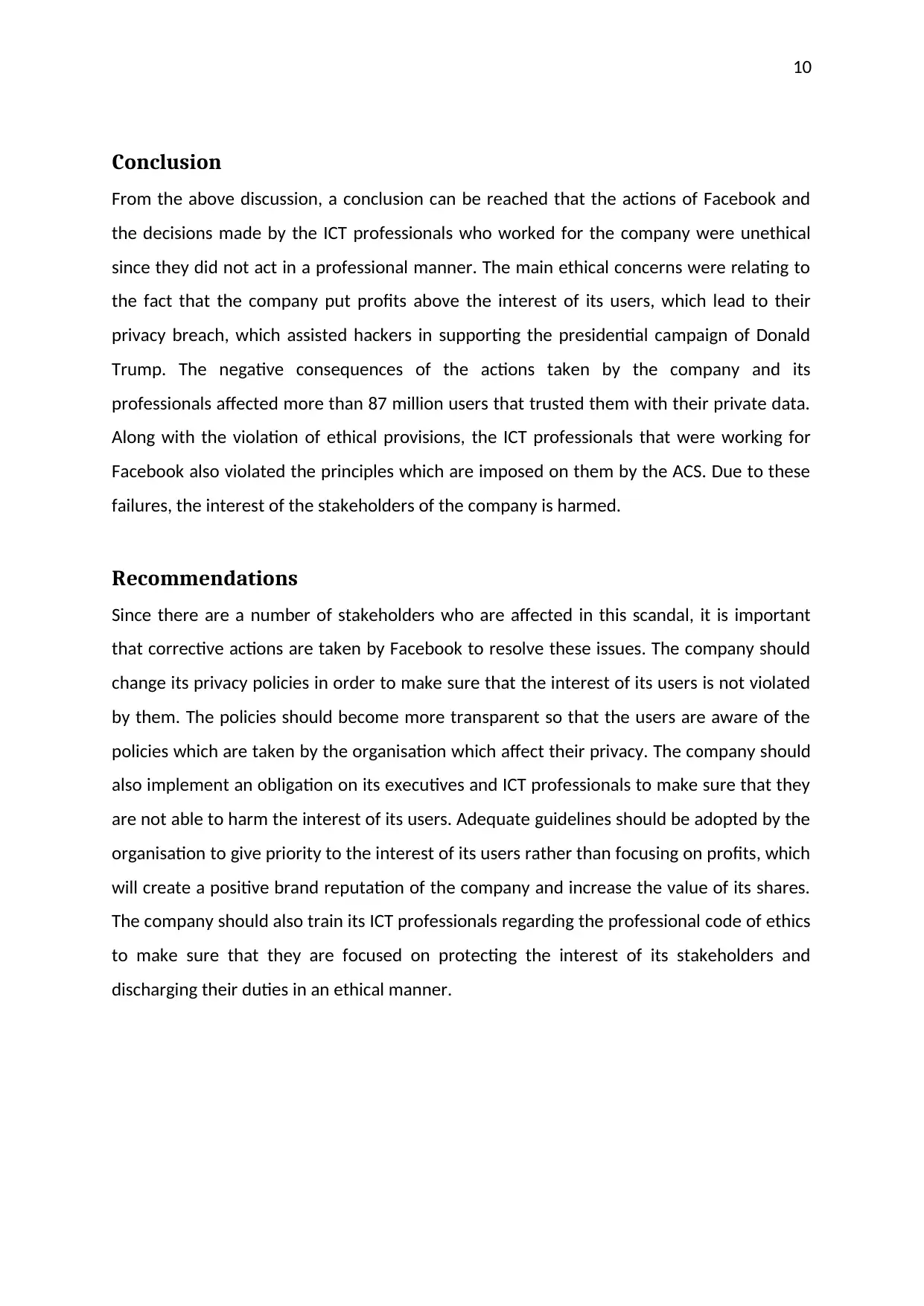
10
Conclusion
From the above discussion, a conclusion can be reached that the actions of Facebook and
the decisions made by the ICT professionals who worked for the company were unethical
since they did not act in a professional manner. The main ethical concerns were relating to
the fact that the company put profits above the interest of its users, which lead to their
privacy breach, which assisted hackers in supporting the presidential campaign of Donald
Trump. The negative consequences of the actions taken by the company and its
professionals affected more than 87 million users that trusted them with their private data.
Along with the violation of ethical provisions, the ICT professionals that were working for
Facebook also violated the principles which are imposed on them by the ACS. Due to these
failures, the interest of the stakeholders of the company is harmed.
Recommendations
Since there are a number of stakeholders who are affected in this scandal, it is important
that corrective actions are taken by Facebook to resolve these issues. The company should
change its privacy policies in order to make sure that the interest of its users is not violated
by them. The policies should become more transparent so that the users are aware of the
policies which are taken by the organisation which affect their privacy. The company should
also implement an obligation on its executives and ICT professionals to make sure that they
are not able to harm the interest of its users. Adequate guidelines should be adopted by the
organisation to give priority to the interest of its users rather than focusing on profits, which
will create a positive brand reputation of the company and increase the value of its shares.
The company should also train its ICT professionals regarding the professional code of ethics
to make sure that they are focused on protecting the interest of its stakeholders and
discharging their duties in an ethical manner.
Conclusion
From the above discussion, a conclusion can be reached that the actions of Facebook and
the decisions made by the ICT professionals who worked for the company were unethical
since they did not act in a professional manner. The main ethical concerns were relating to
the fact that the company put profits above the interest of its users, which lead to their
privacy breach, which assisted hackers in supporting the presidential campaign of Donald
Trump. The negative consequences of the actions taken by the company and its
professionals affected more than 87 million users that trusted them with their private data.
Along with the violation of ethical provisions, the ICT professionals that were working for
Facebook also violated the principles which are imposed on them by the ACS. Due to these
failures, the interest of the stakeholders of the company is harmed.
Recommendations
Since there are a number of stakeholders who are affected in this scandal, it is important
that corrective actions are taken by Facebook to resolve these issues. The company should
change its privacy policies in order to make sure that the interest of its users is not violated
by them. The policies should become more transparent so that the users are aware of the
policies which are taken by the organisation which affect their privacy. The company should
also implement an obligation on its executives and ICT professionals to make sure that they
are not able to harm the interest of its users. Adequate guidelines should be adopted by the
organisation to give priority to the interest of its users rather than focusing on profits, which
will create a positive brand reputation of the company and increase the value of its shares.
The company should also train its ICT professionals regarding the professional code of ethics
to make sure that they are focused on protecting the interest of its stakeholders and
discharging their duties in an ethical manner.
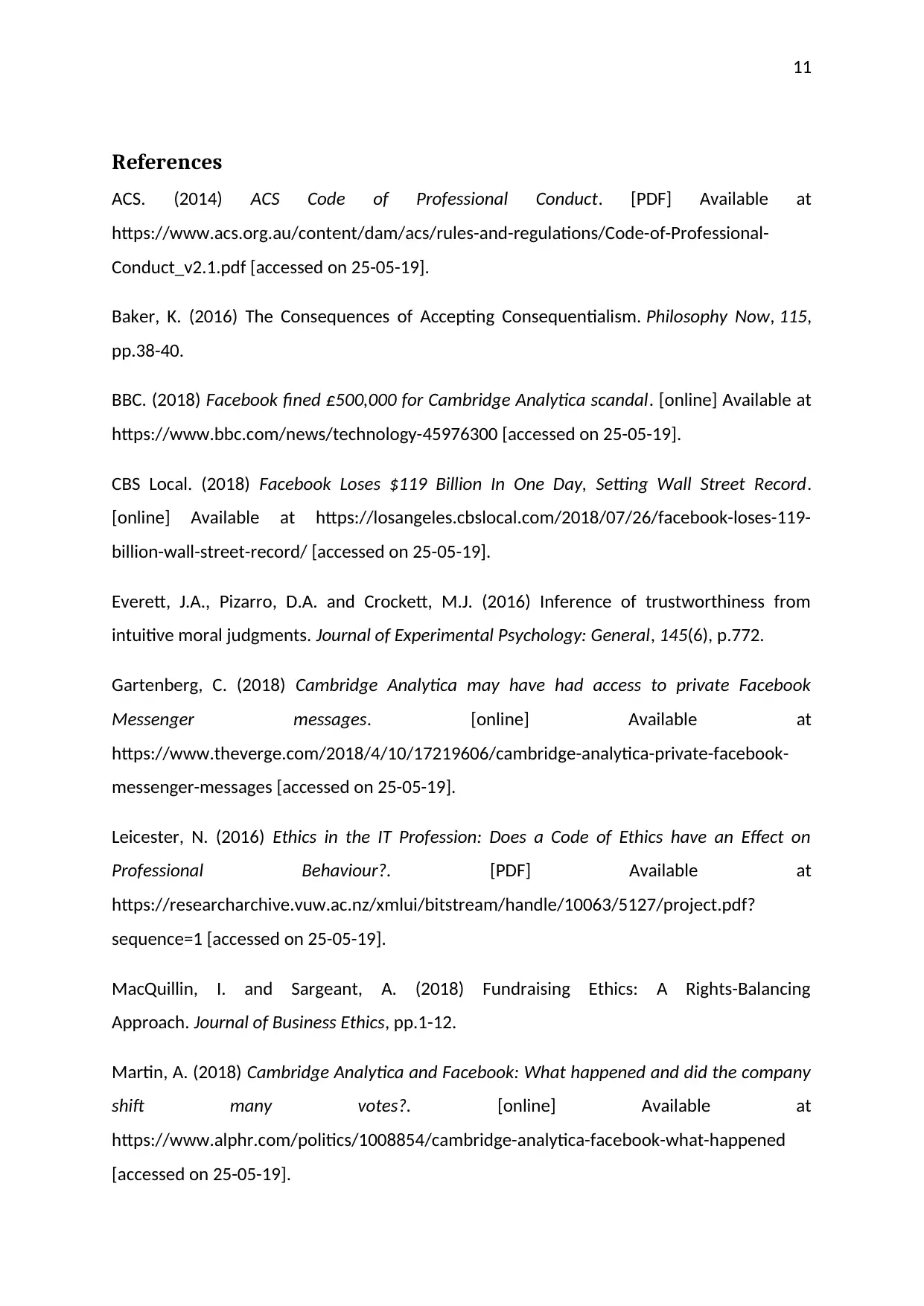
11
References
ACS. (2014) ACS Code of Professional Conduct. [PDF] Available at
https://www.acs.org.au/content/dam/acs/rules-and-regulations/Code-of-Professional-
Conduct_v2.1.pdf [accessed on 25-05-19].
Baker, K. (2016) The Consequences of Accepting Consequentialism. Philosophy Now, 115,
pp.38-40.
BBC. (2018) Facebook fined £500,000 for Cambridge Analytica scandal. [online] Available at
https://www.bbc.com/news/technology-45976300 [accessed on 25-05-19].
CBS Local. (2018) Facebook Loses $119 Billion In One Day, Setting Wall Street Record.
[online] Available at https://losangeles.cbslocal.com/2018/07/26/facebook-loses-119-
billion-wall-street-record/ [accessed on 25-05-19].
Everett, J.A., Pizarro, D.A. and Crockett, M.J. (2016) Inference of trustworthiness from
intuitive moral judgments. Journal of Experimental Psychology: General, 145(6), p.772.
Gartenberg, C. (2018) Cambridge Analytica may have had access to private Facebook
Messenger messages. [online] Available at
https://www.theverge.com/2018/4/10/17219606/cambridge-analytica-private-facebook-
messenger-messages [accessed on 25-05-19].
Leicester, N. (2016) Ethics in the IT Profession: Does a Code of Ethics have an Effect on
Professional Behaviour?. [PDF] Available at
https://researcharchive.vuw.ac.nz/xmlui/bitstream/handle/10063/5127/project.pdf?
sequence=1 [accessed on 25-05-19].
MacQuillin, I. and Sargeant, A. (2018) Fundraising Ethics: A Rights-Balancing
Approach. Journal of Business Ethics, pp.1-12.
Martin, A. (2018) Cambridge Analytica and Facebook: What happened and did the company
shift many votes?. [online] Available at
https://www.alphr.com/politics/1008854/cambridge-analytica-facebook-what-happened
[accessed on 25-05-19].
References
ACS. (2014) ACS Code of Professional Conduct. [PDF] Available at
https://www.acs.org.au/content/dam/acs/rules-and-regulations/Code-of-Professional-
Conduct_v2.1.pdf [accessed on 25-05-19].
Baker, K. (2016) The Consequences of Accepting Consequentialism. Philosophy Now, 115,
pp.38-40.
BBC. (2018) Facebook fined £500,000 for Cambridge Analytica scandal. [online] Available at
https://www.bbc.com/news/technology-45976300 [accessed on 25-05-19].
CBS Local. (2018) Facebook Loses $119 Billion In One Day, Setting Wall Street Record.
[online] Available at https://losangeles.cbslocal.com/2018/07/26/facebook-loses-119-
billion-wall-street-record/ [accessed on 25-05-19].
Everett, J.A., Pizarro, D.A. and Crockett, M.J. (2016) Inference of trustworthiness from
intuitive moral judgments. Journal of Experimental Psychology: General, 145(6), p.772.
Gartenberg, C. (2018) Cambridge Analytica may have had access to private Facebook
Messenger messages. [online] Available at
https://www.theverge.com/2018/4/10/17219606/cambridge-analytica-private-facebook-
messenger-messages [accessed on 25-05-19].
Leicester, N. (2016) Ethics in the IT Profession: Does a Code of Ethics have an Effect on
Professional Behaviour?. [PDF] Available at
https://researcharchive.vuw.ac.nz/xmlui/bitstream/handle/10063/5127/project.pdf?
sequence=1 [accessed on 25-05-19].
MacQuillin, I. and Sargeant, A. (2018) Fundraising Ethics: A Rights-Balancing
Approach. Journal of Business Ethics, pp.1-12.
Martin, A. (2018) Cambridge Analytica and Facebook: What happened and did the company
shift many votes?. [online] Available at
https://www.alphr.com/politics/1008854/cambridge-analytica-facebook-what-happened
[accessed on 25-05-19].
⊘ This is a preview!⊘
Do you want full access?
Subscribe today to unlock all pages.

Trusted by 1+ million students worldwide
1 out of 13
Related Documents
Your All-in-One AI-Powered Toolkit for Academic Success.
+13062052269
info@desklib.com
Available 24*7 on WhatsApp / Email
![[object Object]](/_next/static/media/star-bottom.7253800d.svg)
Unlock your academic potential
Copyright © 2020–2026 A2Z Services. All Rights Reserved. Developed and managed by ZUCOL.



